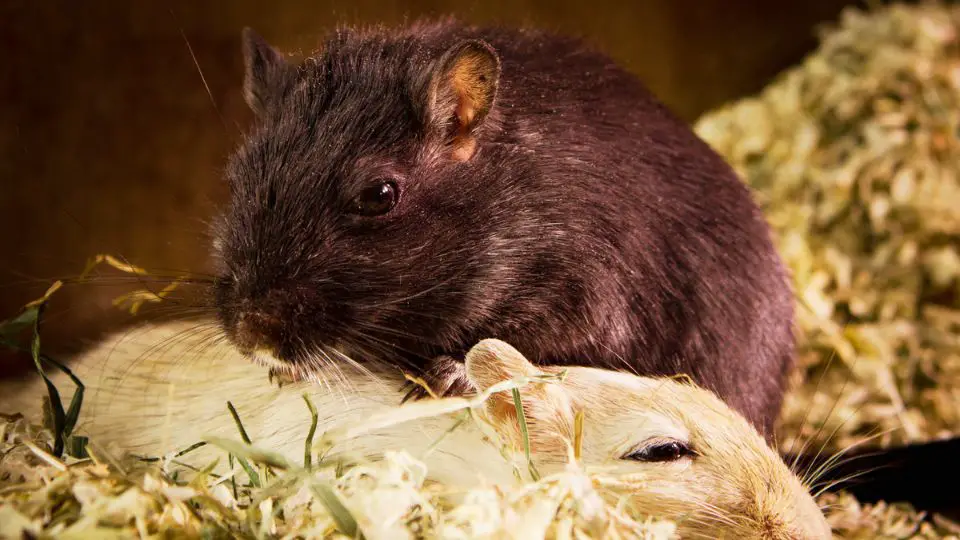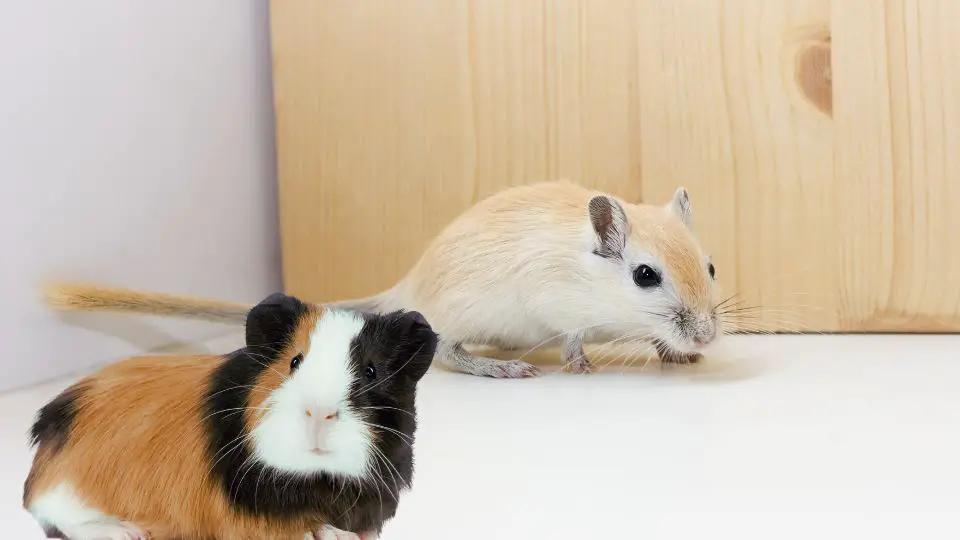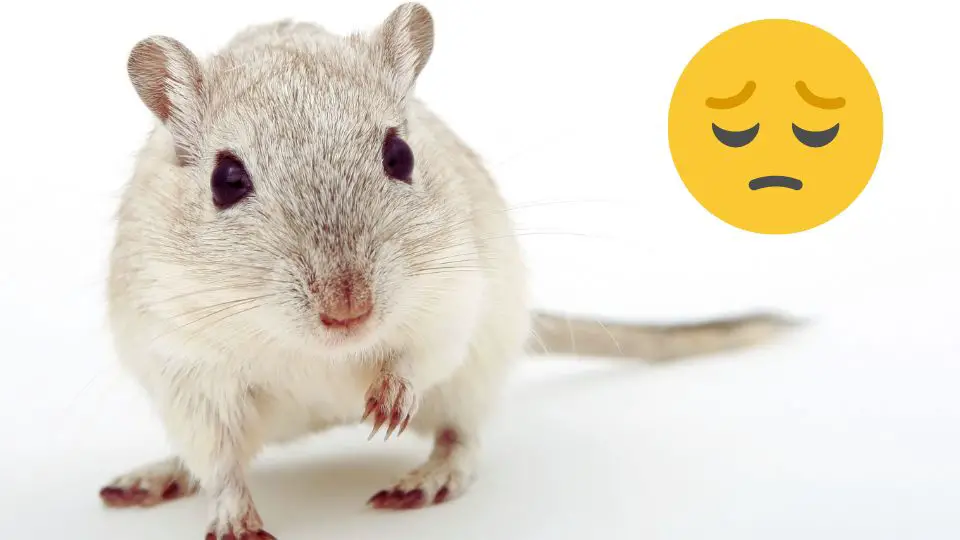Gerbils are active and curious pets that can sometimes make a mess in their environment. They love to dig, burrow, chew, and explore, which can result in scattered bedding, scattered food, and chewed materials.
While a little mess is expected, there are steps you can take to minimize the mess created by gerbils.
By understanding their natural behaviors, providing appropriate cage setup and enrichment, practicing regular cleaning and maintenance, and supervising playtime, you can keep your gerbil’s living space cleaner and more enjoyable for both you and your furry friend.
Understand the natural behavior of gerbils
Gerbils are small and curious creatures with natural instincts and behaviors that can sometimes lead to mess-making. Understanding their natural behavior is essential for managing and preventing messes effectively. Here are some key aspects of gerbil behavior to consider:
- Digging: Gerbils are avid diggers by nature. In their natural habitat, they create intricate burrows and tunnels for shelter and safety. This behavior can result in displaced bedding, scattered substrate, and even small tunnels in their cage.
- Burrowing: Gerbils have a strong instinct to burrow, which involves creating tunnels and hiding spaces in their environment. They may rearrange bedding material and create holes in it as they burrow and create nests.
- Chewing: Gerbils have continuously growing teeth, and chewing helps them maintain proper dental health. They may chew on cage accessories, bedding, or even items outside their cage if given the opportunity.
Understanding these natural behaviors is the first step in managing messes effectively. While it may be challenging to completely eliminate mess-making behaviors, there are strategies to minimize and redirect them.
Provide suitable outlets for natural behaviors
- Offer a deep layer of appropriate bedding material, such as paper-based bedding or aspen shavings. This allows gerbils to satisfy their digging and burrowing instincts while containing the mess within the cage.
- Provide chew toys and safe items for them to gnaw on, such as wooden blocks or chew sticks. This helps redirect their chewing behavior away from cage accessories or other inappropriate items.
Provide appropriate cage and bedding materials
Providing an appropriate cage and bedding materials is crucial for minimizing mess and maintaining a clean and comfortable environment for your gerbils. Here are some key considerations when selecting cage options and bedding materials:
Cage Selection
Opt for cages with solid flooring or deep bedding trays. Solid flooring helps contain bedding materials and prevents them from spilling out of the cage. Deep bedding trays provide ample space for gerbils to dig and burrow while keeping the mess contained within the cage.
Bedding Materials
Choose bedding materials that are absorbent, odor-controlling, and easy to clean. Avoid materials that are dusty or have strong odors, as they can be irritating to gerbils and contribute to mess. Popular bedding options for gerbils include paper-based bedding, aspen shavings, or a mixture of both. These materials provide comfort, absorb moisture, and are relatively easy to clean.
Deep Layer of Bedding
Provide a deep layer of bedding in the cage to accommodate gerbils’ natural digging and burrowing behaviors. A minimum depth of 2-3 inches is recommended to allow gerbils to create tunnels and nests. The deep bedding helps contain messes within the cage and provides an appropriate substrate for their natural behaviors.
Spot Cleaning
Regularly spot clean the cage by removing soiled bedding and waste. This prevents odor buildup and maintains cleanliness. Spot cleaning should be done at least once a day or as needed to keep the cage tidy.
Full Cage Cleaning
Perform a full cage cleaning on a regular basis. This involves removing all bedding, scrubbing the cage with mild soap and water, rinsing thoroughly, and allowing it to dry completely before adding fresh bedding. The frequency of full cage cleaning depends on the size of the cage, the number of gerbils, and their mess-making habits. A general guideline is to conduct a full cleaning every 1-2 weeks.
Regular cleaning and maintenance
Regular cleaning and maintenance are essential for providing a clean and hygienic living environment for your gerbils. By following a proper cleaning routine, you can ensure the well-being of your gerbils and promote their overall health. Here are our tips on how to maintain a clean gerbil habitat:
Cage Cleaning Frequency
It’s important to establish a regular schedule for cleaning your gerbil’s cage. The frequency of cleaning depends on various factors such as the size of the cage, the number of gerbils, and their mess-making habits. As a general guideline, spot cleaning should be done daily or as needed, while a complete cage cleaning should be performed every 1-2 weeks.
Spot Cleaning
Spot cleaning involves removing any soiled bedding, droppings, or uneaten food on a daily basis. Use a scoop or a small shovel to carefully remove these waste materials without disturbing the rest of the bedding. Spot cleaning helps to maintain cleanliness and prevent odor buildup in the cage.
Bedding Replacement
As part of the regular cleaning routine, it’s important to replace the bedding in the cage. Depending on the type of bedding you use, this may be necessary every 1-2 weeks or as needed. Remove all the old bedding and replace it with fresh, clean bedding material. Ensure that the bedding is distributed evenly throughout the cage, providing a comfortable and hygienic environment for your gerbils.
Sanitizing Accessories
Gerbils may have various accessories in their cage, such as toys, water bottles, and food dishes. These accessories should be cleaned regularly to prevent the buildup of bacteria and ensure the health of your gerbils. Wash the accessories with warm water and mild soap, rinsing them thoroughly. Allow them to air dry completely before placing them back in the cage.
Cage Disinfection
Occasionally, it is necessary to thoroughly clean and disinfect the gerbil’s cage. This can be done during a full cage cleaning, which typically occurs every 1-2 weeks. Remove all the bedding, toys, and accessories from the cage. Clean the cage using a pet-safe disinfectant or a mixture of vinegar and water. Rinse the cage thoroughly and allow it to dry completely before adding fresh bedding and returning the accessories.
Use feeding and foraging techniques
When it comes to feeding your gerbils, there are strategies you can employ to minimize mess and keep their living space clean. By using feeding and foraging techniques, you can not only reduce mess but also engage your gerbils mentally and physically.
Let’s explore some helpful tips to achieve this:
- Use Food Dishes: Opt for shallow food dishes that are easy to clean. This helps prevent excessive food scattering and keeps the feeding area more contained. Choose dishes that are stable and can’t be easily tipped over by your curious gerbils.
- Foraging Toys and Puzzle Feeders: Introduce interactive feeding methods that require your gerbils to work for their food. Foraging toys and puzzle feeders can keep them mentally stimulated while encouraging natural foraging behaviors. These toys typically have compartments or hidden compartments where you can hide small portions of food. This way, your gerbils will have to explore and “hunt” for their meals, reducing the chances of food being scattered all over their enclosure.
- Hay Racks and Foraging Balls: Another effective method is to use hay racks or foraging balls to provide hay or other treats. These accessories help keep the hay contained and reduce the mess created by scattering it around. Hay racks can be attached to the side of the cage, while foraging balls can be filled with hay and rolled around by your gerbils, providing both mental and physical stimulation.
- Portion Control: Be mindful of the amount of food you provide to your gerbils. Overfilling their dishes or scattering excessive amounts of food can lead to wastage and mess. Consider their daily food requirements and provide appropriate portion sizes to minimize leftover food that may be scattered or soiled.
Offer appropriate toys and enrichment
Gerbils are naturally curious and active creatures that require mental stimulation and physical exercise to stay happy and healthy. By providing appropriate toys and enrichment, you can redirect their natural behaviors and reduce the likelihood of destructive habits and mess-making.
Here are some options that we consider great to keep your small pet engaged and entertained.
- Chew Toys: Gerbils have a natural instinct to chew, and providing safe chew toys is essential to prevent them from damaging their cage or accessories. Look for chew toys made from safe materials like untreated wood or hard plastic. These toys satisfy their natural chewing needs and help keep their teeth healthy and worn down.
- Tunnel Systems: Gerbils love to dig and burrow, and offering tunnel systems allows them to engage in their natural behaviors while keeping mess contained. You can find various tunnel options made from materials like cardboard, plastic, or flexible tubes. These tunnels provide hiding spots, promote exercise, and encourage exploration.
- Digging Boxes: Create a designated digging area by providing a shallow box filled with safe substrate like dust-free bedding or shredded paper. This allows your gerbils to dig and burrow to their heart’s content while keeping the mess contained within the designated space.
- Exercise Wheels: Gerbils have high energy levels and love to run, making exercise wheels a fantastic addition to their enclosure. Choose a solid-surface wheel without gaps to prevent injuries. Ensure the wheel is an appropriate size for your gerbils, allowing them to run comfortably without straining their backs.
- Puzzle Toys and Treat Dispensers: Engage your gerbils mentally by providing puzzle toys and treat dispensers. These toys require problem-solving skills to access hidden treats or navigate through obstacles. Not only do they provide mental stimulation, but they also help prevent boredom and reduce destructive behavior.
- Ladders and Climbing Structures: Gerbils enjoy climbing and exploring vertical spaces. Install ladders and climbing structures in their enclosure to provide opportunities for exercise and enrichment. These can be made of non-toxic materials like wood or plastic and should be securely attached to ensure your gerbils’ safety.
Remember to rotate and introduce new toys regularly to keep your gerbils’ environment fresh and exciting. Keep an eye on their interaction with toys and remove any items that become damaged or unsafe.
FAQ
Are gerbils sensitive to smell?
Yes, gerbils have a keen sense of smell. They rely on their sense of smell to navigate their surroundings, communicate with other gerbils, and detect potential dangers. Strong or unpleasant smells can be stressful for gerbils and may impact their overall well-being. It’s important to keep their environment clean and avoid exposing them to strong odors or chemicals.
How messy are gerbils?
Gerbils are generally considered tidy pets, but they do have natural behaviors that can result in some mess. They love to dig, burrow, and explore, which can sometimes lead to scattered bedding or substrate. Gerbils also enjoy chewing, so they may leave behind small pieces of chewed materials. However, with proper cage setup, regular cleaning, and appropriate enrichment, you can manage and minimize the mess created by gerbils.
Where do you put gerbils when cleaning a cage?
When cleaning a gerbil’s cage, it’s best to temporarily relocate them to a safe and secure place. You can use a separate temporary enclosure, such as a small carrier or a playpen, to keep your gerbils while you clean their cage. Ensure that the temporary space is well-ventilated, free from hazards, and provides some enrichment, such as toys or hiding spots, to keep them comfortable during the cleaning process.
How long do gerbils take to settle in?
The time it takes for gerbils to settle in can vary from one gerbil to another. On average, it may take a few days to a couple of weeks for gerbils to fully adjust to their new environment. During this time, they may exhibit cautious behavior, such as hiding more often or being less active. Patience and providing a consistent routine, along with a comfortable and enriched habitat, will help your gerbils feel secure and settle in more quickly.
Conclusion
Keeping your gerbil’s environment clean and organized is not only beneficial for you but also for your gerbil’s overall well-being. By understanding their natural instincts and providing appropriate care, you can minimize the mess created by gerbils.
Remember to choose suitable cage options, provide absorbent bedding materials, practice regular cleaning and maintenance, offer interactive feeding methods and appropriate toys, and supervise playtime outside the cage. With these strategies in place, you can create a tidy and comfortable habitat for your gerbil while allowing them to engage in their natural behaviors. Enjoy the company of your furry friend in a cleaner and more organized gerbil-friendly space.







